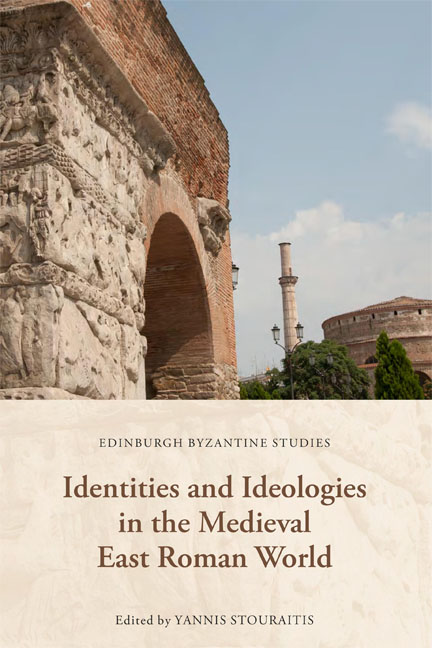Introduction - The Ideology of Identities and the Identity of Ideologies
Published online by Cambridge University Press: 25 January 2025
Summary
Modern scholarship has devoted a great deal of attention to the research of collective identity and political ideology in the so-called Byzantine Empire. In the context of the revived scholarly dialogue on these topics in roughly the last two decades, a workshop that was organised at the University of Vienna in 2015 aimed to approach ‘identity’ and ‘ideology’ in the Byzantine world through a broader perspective. Our intention was to redirect the focus of the discussion on various kinds of identifications, the forms they took and the means through which they were articulated, as well as on the content and social function of various sets of ideas and beliefs in the medieval East Roman geopolitical sphere between roughly the sixth and fifteenth centuries. The current volume is the product of that discussion, which was enriched with additional contributions on the way. It represents what we believe to be the first effort to address a wide range of different aspects of the ways in which various groups or individuals in the geopolitical sphere of the medieval East Roman Empire perceived themselves and one another, as well as the world they lived in.
Our main goal was to broaden our knowledge about the nature of the different types of sources that throw light on ‘identities’, about how these ‘identities’ were ascribed and attributed or adopted and about the understandings and misunderstandings that different modes of identifying oneself, one's kith and kin and those outside these circles generated, while unravelling the potential interrelation between identification practices and various sets of ideas and beliefs. Moreover, we wanted to address the ways in which modern researchers have attempted to describe these phenomena and make sense of them and the dynamics of ‘identity’ and ‘ideology’ in a past culture. With respect to that, this introductory chapter will touch upon the central concepts of the discussion, namely ‘identity’ and ‘ideology’, whose content may vary according to author and whose analytical usefulness is still a focus for disagreement. By offering some insight into the definitional background and the various uses of these terms, we hope to provide readers with a conceptual framework that will allow them to better assess the individual contributions to the present volume.
- Type
- Chapter
- Information
- Publisher: Edinburgh University PressPrint publication year: 2022

